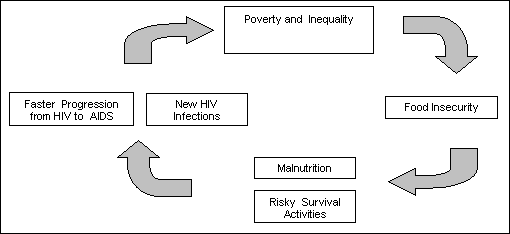There is a clear and critical two-way relationship between HIV/AIDS and food insecurity in Southern Africa. The pandemic is being driven by the very factors that cause malnutrition: poverty and inequality. The hunger currently experienced by millions across the region increases the likelihood of HIV infection, as people are driven to adopt risky coping strategies in order to survive. These include travelling to search for food and additional sources of income, migrating, engaging in hazardous work, and, most lethally, women exchanging sex for money or food. These actions facilitate the spread of HIV, putting individuals - especially women and children - at high risk of infection.
For those already infected with the virus, malnutrition exhausts the immune system, which makes people more susceptible to malaria, tuberculosis, and other opportunistic diseases, and leads to faster progression from HIV to AIDS. People weakened by HIV/AIDS find it harder to access food, because they are often not strong enough to work or to walk long distances to the market.

Successful efforts to improve the food security and livelihoods of families should reduce the probability of HIV infection, slow the progression of HIV to AIDS and increase the resilience of households trying to recover from HIV-related illness and death. Proper nutritional support can speed recuperation from HIV-related infections, and allow people living with HIV/AIDS to participate directly in their own care. Efforts to reduce the rate of HIV infection in adults and children should - if successful - have a positive impact on people's food security.
|






